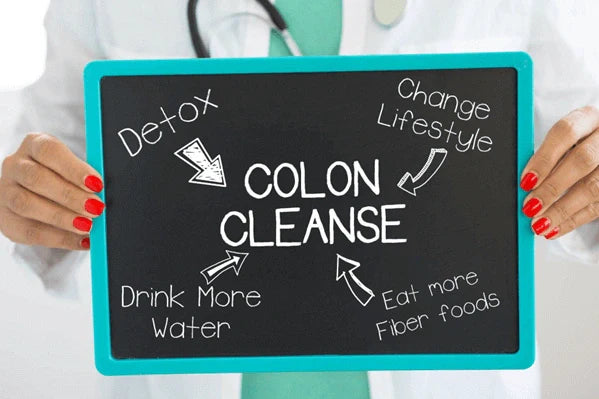
Select the option that best fits you.


It can be hard living with IBS. Uncomfortable symptoms like bloating, constipation, gas, and abdominal pain ruin your days. When things get really bad, it feels like the pain will never end and there's no hope for a solution. It can be debilitating and it's extremely frustrating, to say the least.
Fortunately, the pain doesn't have to last forever. And that's what this post is all about—providing you with the best way to cleanse for IBS so that you can gain some relief and take back control over your life.
It's not 100% clear exactly what causes IBS. However, there appear to be several key indicators, which include:
Now, to answer the question: How can I calm the IBS in my gut?
The best way to fight IBS, calm any flare-ups, and prevent recurring episodes is by focusing on three primary areas—diet, exercise, and your ability to manage and reduce stress.
Below are 5 tips to help you detox and enjoy a successful IBS cleanse.
This might be the ultimate IBS cleanse diet. FODMAP stands for fermentable oligosaccharides, disaccharides, monosaccharides, and polyols. The low FODMAP diet aims to eliminate these from your diet, as these are carbohydrates your gut doesn't digest well, which can result in some pretty adverse symptoms.
Specifically, when FODMAPs reach the large intestine, they get fermented by the trillions of bacteria that reside there, initiating symptoms like gas, abdominal pain, and bloating. Another thing is that FODMAPs create more water in the small intestine, which causes your bowel movements to be “runny” and lead to diarrhea (a prominent symptom of IBS). Decreasing the number of FODMAPs in your diet may help alleviate symptoms.
On low FODMAP, you remove trigger foods to see what may be bothering you, and then you slowly introduce one or two foods at a time to pinpoint what might be causing you issues. Eventually, after your gut has healed, you'll want to reintroduce almost all FODMAP foods since many are prebiotic, feeding beneficial bacteria. Intolerance of many FODMAP foods can be an indicator of gut dysbiosis rather than the cause.
With constipation being a main issue of IBS, increasing fiber intake can provide some relief. Fiber helps soften your stool and enables it to pass through your digestive tract without difficulty.
This one might be a little bit of a challenge considering a decent number of FODMAPS are high in fiber. But where there's a will, there's a way! And we've put together a list of some high-fiber, low FODMAP foods that go well with any cleanse for IBS diet:
A proper cleanse for IBS isn't just about diet. Another way to detox for IBS is getting up and getting active.
Physical activity is not only beneficial for your heart, cardiovascular health, and preventing a variety of diseases and conditions, but it's also been shown to provide relief and calm IBS flare-ups.
One study took a look at how exercise impacted IBS symptoms. 109 females participated in the study, all of whom had IBS and weren't considered physically active. Engaging in low to moderate-intensity aerobic exercise resulted in relief of IBS symptoms for the study's participants.
These findings suggest that something as simple as a brisk walk around the neighborhood 3-4 times per week for 20 minutes may be extremely beneficial for IBS relief.
When you're stressed, it can trigger the symptoms related to your IBS and make things worse. Finding ways to relax and calm your mind reduces those psychological stressors that amplify symptoms and IBS flare-ups.
To relax and relieve stress, try mindfulness meditation, yoga (try these 13 stretches for improved gut health ), or diaphragmatic breathing exercises.
One study of 68 adults with IBS found that taking an 8-week mindfulness-based stress reduction (MBSR) training course resulted in digestive relief for those with IBS.
Consider taking a probiotic supplement to boost the number of good bacteria in your gut, which can help reduce IBS symptoms. There's a ton of research out there that backs the use of probiotics for treating IBS.
Benefits of taking probiotics for IBS include:
Bacteria strains from the Lactobacillus and Bifidobacterium families are the best for IBS relief.
Having IBS can be pretty uncomfortable. But you don't have to suffer forever!
If you're looking for relief from your symptoms, the best cleanse for IBS comes down to diet, exercise, and finding ways to effectively manage stress.
Instead of a generic, one-size-fits-all solution, try Floré Personalized Probiotics, designed to provide relief for a variety of gut-related conditions, including IBS.
We analyze the trillions of microbes in your gut and come up with a custom solution tailored to your specific needs. All you have to do is take one pill a day and we ship directly to your door!
We can support you on the path to better wellness by providing you with the information you need to start the conversation, and we can provide tailored support for your provider.
